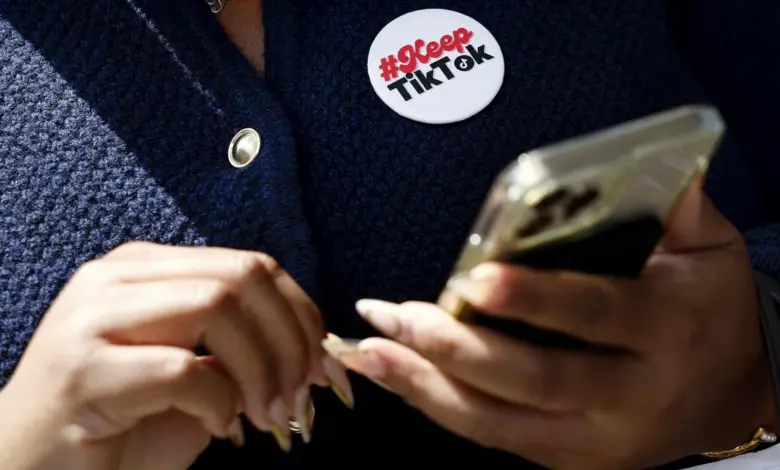
It was a surprising comment coming from the guy who first tried to ban TikTok from the United States over worries that the Chinese government could use the app to gather intelligence on Americans. In his 2020 executive order that unsuccessfully tried to ban the app, Trump said TikTok’s data collection could allow China’s government “to track the locations of Federal employees and contractors, build dossiers of personal information for blackmail, and conduct corporate espionage.”
Since Trump’s 2020 executive order, US lawmakers have largely agreed that it poses a risk. State and federal government agencies and the military have restricted staff from downloading the app on their work devices, beginning during Trump’s first term. And last year, Congress passed a law with bipartisan support requiring parent company ByteDance to sell TikTok to a non-Chinese owner or face a ban, which the Supreme Court upheld on national security grounds.
But Trump’s comment about data security — while dramatically oversimplified — may have some merit.
Americans’ data is ‘widely available’
Some privacy and technology experts say simply transferring control of TikTok to a new owner won’t be a silver bullet to protect US users’ data from China, given that Beijing has plenty of other avenues for accessing information about Americans.
Other social media platforms and websites collect similar data to TikTok — such as location data, search history and purchase history — and many other sites sell that data to data brokers, which make it available online for any willing buyer.
“The Chinese government can simply buy US user data from data brokers. It is widely available,” Eva Galperin, director of cybersecurity at the Electronic Frontier Foundation, told CNN’s “Terms of Service” podcast earlier this month.
“If US lawmakers really cared about protecting American users’ data from the Chinese government, they would pass comprehensive data privacy legislation that would limit what kind of data all companies can collect and what kind of data all companies can sell,” she said. (TikTok CEO Shou Chew testified before Congress in 2023 that the company does not sell to data brokers.)
China also has advanced cyber-espionage capabilities that in just the past year have allowed the country to spy on the Committee on Foreign Investment in the US, the government office that reviews foreign investments for national security risk, as well as American telecom networks.
Data collection isn’t the only concern surrounding TikTok. US lawmakers worry that the Chinese government could force ByteDance to manipulate the TikTok algorithm, to spread Chinese propaganda or disinformation, or to sow discord among Americans.
But even then, Chinese government actors have also successfully weaponized US-owned social media platforms to spread disinformation and harass Americans. (TikTok has also denied that Beijing would have access to manipulate its algorithm.)
Trump’s change of heart
Still, contrary to Trump’s point, TikTok is far more than just “young kids watching crazy videos.” Around half of the US population — 170 million Americans — use the platform, often to discuss news, politics and world events.
Trump’s comment may be aimed at garnering support for his proposal that, rather than a wholesale transfer of US TikTok to an American buyer, the United States and China could share control of the platform as a 50-50 joint venture. It’s unclear if that suggestion would satisfy the letter of the TikTok sale-or-ban law, which seeks to prevent a foreign adversary from controlling such a popular social media platform.
The reversal in Trump’s stance on TikTok has raised questions about why he is apparently less concerned now about TikTok threatening US national security. Trump has said he changed his mind because he “got to use it.”
One explanation “could be that China is less powerful than it was five years ago. Their economy isn’t as strong as it used to be; internationally, they’re less vocal and active and influential,” said Sarah Kreps, director of the Tech Policy Institute at Cornell University.
But, Kreps said, that alone “doesn’t seem enough to me to explain why there was such a national security concern a few years ago and now this is kind of being waved off as not a concern,” especially given China’s ongoing interest in and success in spying on Americans through other means, she said.
Still, whether TikTok’s US operations are sold in part or entirely, it could be difficult — if not impossible — to ensure that Beijing no longer has any means of controlling it, given that the technology originated in China.
“Whether you have 25 percent, 50 percent, 99 percent American-owned, it’s a legitimate question of whether from an engineering perspective, you can disentangle this Chinese control within the source code from TikTok itself,” Kreps said.
TikTok, for its part, has tried for years to assuage US concerns by storing American users’ data in Oracle-owned servers in the United States, offering access for third-party monitors to review its systems and saying it could not be accessed by its China-based parent company even if Beijing officials demanded it — albeit unsuccessfully.
The national security case for a ban
Although it may not be a perfect solution, some experts say the sale of TikTok — in its entirety — is still crucial for US national security because of the potential that China could use TikTok’s trove of user data and manipulate the app’s algorithm to target Americans with specific videos they might be inclined to believe or engage with.
Justice Brett Kavanaugh summarized that concern from Congress in the Supreme Court hearing earlier this month over TikTok’s challenge to the sale-or-ban law, which the court shot down.
American lawmakers, Kavanaugh said, “were concerned that China was accessing information about millions of Americans, tens of millions of Americans, including teenagers, people in their twenties” and that the country could use that information “to turn people, to blackmail people — people who a generation from now will be working in the FBI or the CIA or in the State Department.”
“I think that’s where it gets really, truly dangerous from a national security perspective,” said Lindsay Gorman, managing director of the German Marshall Fund’s technology program. In theory, ByteDance, at the behest of China, could use “this incredibly powerful tool to influence Americans at the… individual level toward certain views and certain actions.”




